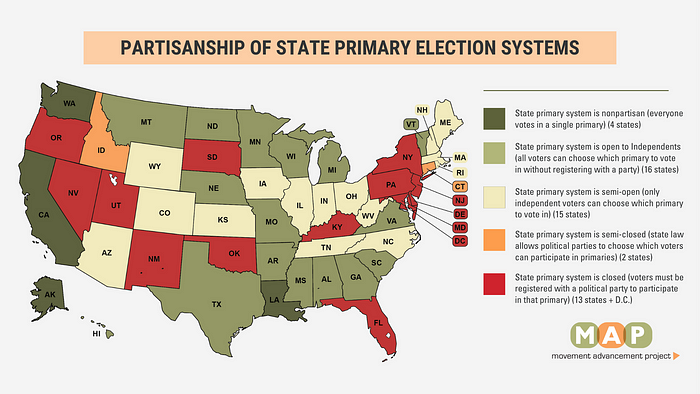Democracy Maps
Super Tuesday Preview: the Voting Landscape in Four Key States

The 2024 election cycle has begun in earnest as state primaries kick off across the country. On March 5 — “Super Tuesday” — 15 states will hold primary elections.
Super Tuesday is traditionally viewed as the most important barometer for the presidential race, but voters across the country will also cast their ballots in a number of competitive primary races for statehouses and Congress.
Here at MAP, we are previewing this important election date by providing an overview of the voting landscape in key states, using the data from our Democracy Maps, which track over 50 aspects of voting and election policies in every state.
How do State Primary Systems Differ?
Distinct from general elections, primary elections differ across the states in terms of the systems used to conduct these contests. The most important differences are centered around whether independent and unaffiliated voters are allowed to participate in the primaries of the two major political parties.

A small number of states have adopted nonpartisan primaries in which a single election is held with candidates from all the political parties on one ballot. In addition, states may use different systems to conduct state level primaries as opposed to presidential contests.
For more details on state primary election types, visit our Democracy Map.
Which States are Voting on Super Tuesday?
Super Tuesday this year will feature primary contests in 15 states:
- Alabama
- Alaska
- Arkansas
- California
- Colorado
- Maine
- Massachusetts
- Minnesota
- North Carolina
- Oklahoma
- Tennessee
- Texas
- Utah
- Vermont
In addition, the results of the Democratic presidential primary in Iowa will be finalized after being conducted through mail voting since January 2024. This preview will focus on key states holding primaries on Super Tuesday.
Minnesota
Voters in Minnesota will cast their ballots in both the Democratic and Republican presidential primaries on March 5. Thirty-nine Republican delegates and 75 Democratic delegates are up for grabs in the presidential nomination contests on Super Tuesday.
Minnesota currently ranks 8th in MAP’s democracy ratings. The state has seen significant recent improvement in our democracy ratings due in large part to a suite of reforms passed in 2023. These improvements include the restoration of voting rights to formerly incarcerated individuals, and allowing people to vote while they complete their probation or parole.
The state also passed omnibus legislation in 2023 that implemented:
- back-end automatic voter registration,
- a permanent mail voting list,
- preregistration for 16-year-olds,
- and protections against election related disinformation, among other reforms.
These improvements place Minnesota in the top ten strongest state democracies in 2024.
Minnesota was the tenth most competitive state in the 2020 presidential election, and recent polling indicates the state will be even more competitive in 2024.
Minnesota’s state government is historically one of the most closely divided in terms of party control in the country, with Democrats in the state only recently gaining a trifecta after a decade of split government. Super Tuesday will provide a preview of how this crucial state will swing in November.
For presidential primaries in Minnesota, each party has a specific ballot, and a voter must request which party ballot they would like to receive. Early in-person voting is already underway in the state and ends the Monday before the primary. Minnesota has one of the longest periods of early voting in the nation at 45 days.
North Carolina
Voters in North Carolina will weigh in on a host of races on Super Tuesday, including presidential primaries for both parties, as well as critical gubernatorial and state supreme court contests. The state is one to watch as it had an extremely close margin of victory — 1.4% — in the 2020 presidential race. Seventy-four Republican delegates and 116 Democratic delegates are set to be allocated in the presidential nomination contests following the primary.
North Carolina currently ranks 34th in MAP’s democracy ratings. The state has been the focus of efforts by Republicans to restrict voting access for years; most notably voters will face renewed requirements to present photo ID in order to cast their ballots in 2024. This follows a state supreme court ruling that revived a law that was previously found to be unconstitutional and racially discriminatory.
Voters will also face new problematic restrictions on mail voting: in addition to existing laws that require mail voters to obtain a signature from a notary or two witnesses, voters will now also need to include a copy of acceptable photo ID (such as a driver’s license) when returning their mail ballot.
In addition, mail ballots must be received by the close of polls on Election Day, rather than the previous three-day window for postmarked ballots to arrive after Election Day. This follows an omnibus bill passed last year by state Republicans over the governor’s veto. According to the North Carolina Board of Elections, 11,000 ballots were received within this three-day period in 2020. Under the state’s new policy, those votes would be unfairly disenfranchised.
North Carolina had one of the slimmest margins in the 2020 presidential election, with former President Trump winning the state by fewer than 100,000 votes. Recent polling indicates another close contest with just a 3% difference between Biden and Trump in one poll.
North Carolina will be one of the primary battleground states in 2024, and not just in terms of the presidency. Voters in the state will also weigh in on party control of the state government. The state legislature is currently held by a narrow supermajority of Republicans, and the current Democratic governor is term limited, setting up an intense competition in the Tar Heel State.
North Carolina primaries are semi-open, meaning that voters affiliated with a particular party must vote in that party’s primary, while unaffiliated voters may choose to vote in either party’s primary. Early in-person voting is now underway in the state and ends on March 2.
Texas
Texas is among the states with the most party delegates at stake, with 161 Republican and 244 Democratic delegates set to be allocated from the state in the presidential nomination contests.
Texas is currently among the five lowest states in our democracy ratings, at 47th overall. Voters will face a number of restrictions to register and cast their ballot in the state. Texas is one of only eight states that do not allow voters to register online, and voters must register 30 days in advance of Election Day (the furthest out allowed by federal law).
Voters also cannot vote by mail without a legal excuse (such as a disability). Those who are allowed to vote by mail will be subject to new prohibitive new ID requirements. These ID requirements have already resulted in a rash of unfairly rejected ballots since implementation.
The state has also sought to enable election denialism by giving more power to partisan poll watchers. For more, see MAP’s report on the dangers of election denialism.
While long viewed as a Republican stronghold, Texas was relatively competitive in 2020, with President Trump winning by less than six percentage points, and recent polling indicates a similar environment in 2024.
U.S Senate and critical congressional races are also forecasted to be competitive in the state. Despite facing a number of restrictions, voters in Texas will have a big say in the 2024 elections.
Texas is an open primary state, where a voter does not have to be affiliated with a particular political party in order to participate in its primary. If no candidate receives the majority of the vote in the initial primary, the top two candidates move on to a runoff election. Early in-person voting is underway in the state and ends on March 1.
Virginia
Voters in Virginia will head to the polls on Super Tuesday to cast their ballots in both presidential primaries, with 48 Republican and 99 Democratic delegates at stake in the presidential nomination contests. Virginia is currently ranked 16th in our state democracy ratings and falls into the Medium category for the Democracy Maps.
Virginia has not seen significant changes in voting rules since 2022, but the state has been impacted by the election denialism movement. A concerning trend emerged in 2023 with states withdrawing from membership in the Electronic Registration Information Center (ERIC), a nonpartisan organization created to assist states in maintaining accurate voter registration lists. Virginia became a part of this trend in May 2023 when the state election commissioner initiated withdrawal from ERIC, citing vague concerns and the withdrawal of other conservative states. These withdrawals highlight the dangers of election denialism as states bow to political pressure and misinformation, despite the fact the ERIC is recognized by experts as the best tool available to maintain accurate voter lists.
While the state did not have a particularly close margin of victory in the 2020 presidential race, recent polling indicates the race may be closer this year. Party control of the state house is also historically competitive, with Democrats currently holding both chambers by narrow margins heading into November.
Virginia is an open primary state, which means a voter does not have to be affiliated with a particular political party in order to participate in its primary. Early in-person voting is underway in the state and ends on March 2.
MAP will continue to cover important election and voting developments throughout the primary calendar and heading into November. For detailed information on more than 50 voting and election policies across the states, visit our Democracy Maps, which are updated in real time.
